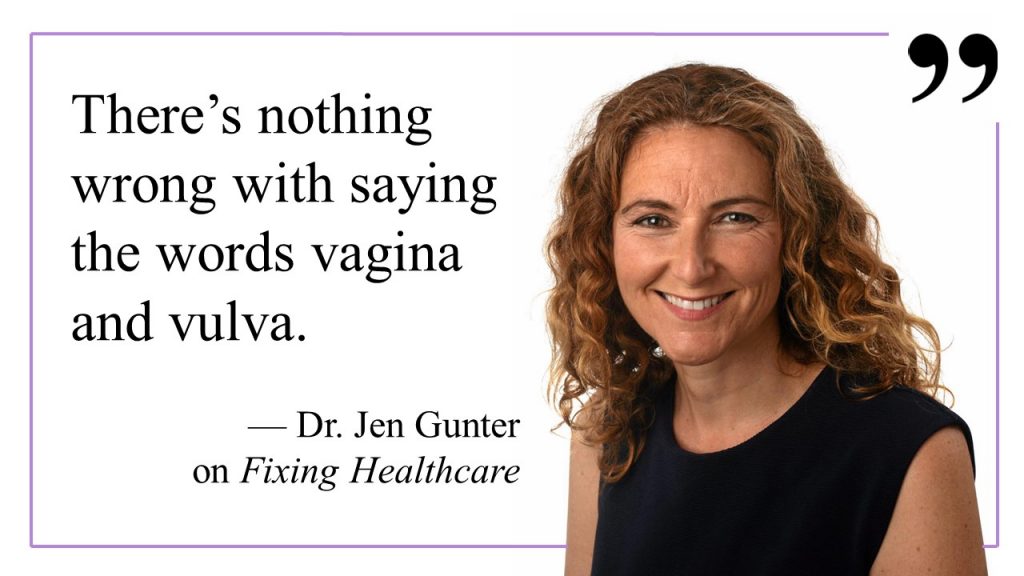Podcast: Play in new window | Download
Subscribe: Spotify | Email | RSS | More
Dr. Jen Gunter is known by many titles. She’s been called Twitter’s resident gynecologist, the Internet’s OB-GYN, and medicine’s fiercest advocate for women’s health. In her writing for The New York Times (and in her bestselling book The Vagina Bible), Gunter has gone after some of the nation’s most powerful players.
“I’ve taken on politicians, I’ve taken on the wellness industrial complex, and most recently, Vagisil, and they’re awful campaign to make teens embarrassed about their normal body smells and function,” she told Fixing Healthcare hosts Dr. Robert Pearl and Jeremy Corr.
In 2015, Gunter’s blistering critiques of Goop, the wellness empire headed by Gwyneth Paltrow, became an internet sensation, sparking a national debate about the pseudoscience that surrounds health and wellness products.
In this episode of Fixing Healthcare, Dr. Gunter takes on the culture of medicine, looking at the role sexism plays in the careers of doctors, the health of patients and the stories we tell about women’s bodies.
Jen Gunter’s Interview Highlights
On the dangers of Goop and the ‘wellness-industrial complex’
“A site like Goop is particularly dangerous, because it mixes good quality information, and they have some good information, with absolute harmful trash. So for example, they sell a coffee enema kit, they promote drinking raw milk, they have people who write content for them who are anti-vaxxers. And so, we know that it just takes one exposure to a medical conspiracy theory for people to start thinking that maybe that’s something they should worry about. Conspiracy theories are very sticky that way. When I’m battling a site like that, it’s because either their products are super harmful.”
On Gunter’s own near-death delivery
“After I delivered, I had sepsis. And I was on two different antibiotics afterwards I was deteriorating and nobody was listening to me. My oxygen levels were dropping, my pH level wasn’t changing. Nobody was listening to me, and I spent a day and a half dying in my hospital bed. It wasn’t until I started screaming and got hysterical and yelled at the attending that I got the care I needed. Now, imagine if I wasn’t a physician, imagine if I was being victimized by racism. I would have died.”
On the word vagina
“When it came time to promote the book (The Vagina Bible), my publisher Kensington wanted to do promoted ads on Twitter and on Facebook. And they were turned down when it had the word ‘vagina’ in it … And my understanding too, is for a lot of the morning shows, saying the word vagina and vulva is a challenge, because I guess they don’t want kids who are eating breakfast with their families to hear the word. I mean, that’s problematic. There’s nothing wrong with saying the words vagina and vulva.”
On how doctors treat women
“I really do feel that women are not listened to in the way that men are, or they have a harder time navigating the system because of that. It just seems that many times, they’re told their pain isn’t that serious. Or they’re told it’s not that bad, or they’re told they’re bleeding isn’t that heavy … I believe a lot of it is just part of the general ways that society dismisses concerns related to the reproductive tract.”
On how doctors treat Black women
“Serious cancer concerns aside, the rate of having ovaries removed is much higher for Black women than it is for white women or Hispanic women. And that can really only be explained with racism, with either people having less access to quality care, people having their concerns not heard, people thinking that you don’t deserve quality care.”
On sexism in medical training
“I trained in the 80s and the early 90s, and you had to be just like the guys and you had to be as tough. And certainly, where I trained there was very little room for someone in a surgical specialty to not act like … a stereotypical version of a male surgeon. You just had to be tough, you had to suck it up. And I think that having only one type of person in a field is terrible … I was in medicine 20 years before there was a woman who was the chair of my department, so I think that says something.”
READ: Full transcript of our discussion with Jen Gunter
Fixing Healthcare is in its fifth season, which focuses on the culture of medicine. For Dr. Robert Pearl, this topic is of vital importance to the health and well-being of patients. For years, he has been researching and reporting on physician culture—efforts that will culminate in the publication of his 2021 book, “Uncaring: How Physician Culture Is Killing Doctors & Patients.”
* * *
Fixing Healthcare is a co-production of Dr. Robert Pearl and Jeremy Corr. Subscribe to the show via Apple Podcasts or wherever you find podcasts. Join the conversation or suggest a guest by following the show on Twitter and LinkedIn.

